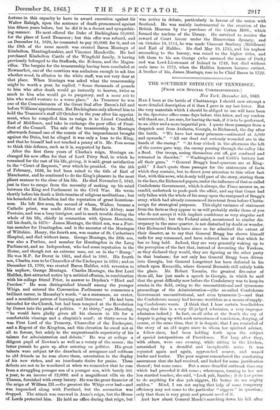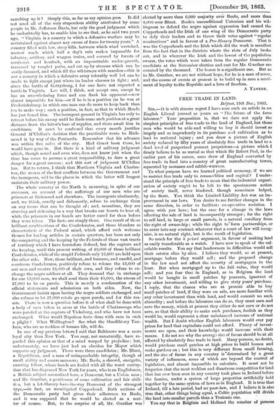THE SOUTHERN ESTIMATE OF TENNESSEE.
[FROM OUR SPECIAL CORRESPONDENT.]
New York, December 5t1, 1863. Han I been at the battle of Chattanooga I should now attempt a more detailed description of it than I gave in my last letter. But the very materials which I should be obliged to use will have been in the Spectator office some days before this letter, and my readers will thank me, lain sure, for leaving the task, if it is to be performed, to an abler and a more impartial pen. I quote these passages from a despatch sent from Atalanta, Georgia, to Richmond, the day after the battle. "We have lost many prisoners—estimated at 5,000 and upwards." "All our dead and seriously wounded are in the bands of the enemy." "At four o'clock in the afternoon the left of the centre gave way, the enemy pouring through the valley like a flood. Our troops, seeing themselves cut off, got confused and retreated in disorder." "Washington's and Cobb's battery lost all their guns." "General Bragg's head-quarters are at Ring- gold." I don't quote these passages for the statements of facts which they contain, but to direct your attention to this other fact that, with this news, which only told part of the story, staring them in the face, the Richmond papers, under the influence of that so called Confederate Government, which is always, the Times assures us, so candid, undertook to pooh-pooh the affair, and say that Grant had only fallen with the whole of his army upon the rearguard of Bragg's army, which had already commenced its retreat from before Chatta- nooga for strategical purposes. This slight variance of statement from the facts as they appear to us will probably strike those of you who do not accept it with implicit confidence as very singular and unaccountable ; but the Federal mind, accustomed to similar dis- crepancy in the same quarter, is not disturbed by doubt or wonder. Our Richmond friends have since so far admitted the extent of their disaster, as to say that General Bragg has shown himself unfit for any command, and have relieved him of that which he has so long held. Indeed, they are very generally waking up to the perception of the fact that, instead of devouring the Yankees, as they declared they would, they are figuring as the other party in that business; for not only has General Bragg been driven into Georgia, but General Longstreet has been defeated in his attack upon Knoxville, where General Burnside still calmly holds the place. Mr. Robert Toombs, the greatest fire-eater of them all, has just made a speech in Georgia, in which he said that the great difficulty now before the Confederacy was to keep its armies in the field, owing to the unconstitutional and tyrannous proceedings of the Administration—(the so-called Confederate Government unconstitutional, and even tyrannous !)—and that the Confederate money had become worthless as a means of supply- ing Confederate wants. (I think that I hear certain bondholders saying that this is a very ill-judged admission, a very improper admission indeed.) In fact, on all sides at the South the cry of despair is going up with such earnestness of conviction, denying, of course, at the same time, that it is despair, that I am reminded of the story of an old negro slave to whom her ipiritual adviser, a fellow-slave, had been holding forth upon the subject of special interpositions of Providence. Not long after they, with others, were one evening, while sitting in the kitchen, astonished by a dreadful and inexplicable noise. It was repeated again and again, approached nearer, and waxed louder and louder. The poor negreea remembered the comforting assurances that she had received, and looked for some justification thereof ; but none came. But a more dreadful outbreak than any which had preceded it did come ; whereupon, turning to her not less startled teacher, she said, "Look yah, Sambo ; if de Lor gwine to do anything for dese yalf niggers, He better do mu mighty sudden." Mind, I am not saying that help of some temporary efficiency may not come to the particular " Diggers " in question ; only that there is very great and present need of it.
And how about General Meade's marching down his hill after marching up it ? Simply this, safer as my opinion goes. It did not need all of the very stupendous ability attributed by some people to Mr. Jefferson Davis, but only the good judgment which he undoubtedly has, to enable him to see that, as he said two years ago, "Virginia is a country in which a defensive warfare may be maintained against almost any excess of force for twenty years." A country filled with low, steep hills, between which wind wretched, narrow roads which half a day's rain makes impassable for infantry, artillery, and waggon trains, and covered by forests of scrub-oak and hemlock, with an impenetrable under-growth, traversed by tangled paths, and cut up by streams which can be easily dammed, and which fill the wilderness with marshes—this is not a country in which a defensive army tolerably well led can be made to fight except just where its leader chooses to fight ; and, since the battle of Gettysburg, I for one have not expected a battle in Virginia. Lee will, I think, not accept one, except he has an overwhelming force and can flank his opponent—now almost impossible for him—or if he is in a position (as he was at Fredericksburg) in which one man can do more to keep back than ten to make way ; such a position, in fact, as that in Which Meade has just found him. The insurgent general in Virginia has only to retreat before his enemy until he finds some such position at a great distance from the latter's base of supplies, and there await him in confidence. It must b3 confessed that every month justifies General M'Clellates decision that the practicable route to Rich- mond is by way of the Peninsula. Remember that his advatite was within five milse of the city. Had Grant been there, he would have gone in. But there is a kind of military judgment which, though sound and even wise, does not know just when the time has come to 'assume a great responsibility, to dare a great danger for a great success ; and this sort of judgment M'Clellan lets. But to return, I think that Northern Virginia and Charles- ton, the scenes of the first conflicts between the Government and the insurgents, will be the places in which the latter will longest maintain their military power.
The whole country at the North is mourning, in spite of our successes, on account of the sufferings of our men who are prisoners at Richmond and elsewhere. The insurgents obstinately, and, we think, crttelly and dishonestly, refuse to exchange them on any terms that can be thought of ; arid, meantime, they are starving and sickening in a way that breaks our hearts to hear of, while the prisoners in our hands are better cared for than before they were taken. The facts are simply these. One result of those brilliant combinations of the Confederates, and those blunders so characteristic of the Federal mind, which afford such welcome themes for leading articles in certain quarters, has been not only the conquering and the keeping by the Federals of those vast tracts of territory which I have heretofore defined, but the capture and the keeping, until this present writing, of 40,000 of those brilliant Confederates, while of the stupid Federals only 13,000 are held upon the other side. Now, those brilliant, and humane, and candid, and courteous Confederates, positively refuse to release the 13,000 of our men and receive 13,000 of their own, and they refuse to ex- change the negro soldiers at all. They demand that in exchange for our 13,000 men, we shall send them their 40,000, the excess of 27,000 to be on parole. This is merely a condensation of the official statements and admissions on both sides. Now, the Government insists upon having the negro soldiers exchanged, and also refuses to let 27,000 rebels go upon parole, and for this rea- son. There is now a question before it of what shall be done with a body of men taken in arms at the battle of Chattanooga who were paroled at the capture of Vicksburg, and who have not been exchanged. What would Napoleon have done with men in such a plight ? What Wellington? See what the bloodthirsty Yan- kees, who are so reckless of human life, will do.
In one of my previous letters I said that Baltimore was a more loyal city than Now York. You may, not unnaturally, have re- garded this opinion as that of a mind warped by prejudice ; but, unfortunately, we have just had an election for Mayor which supports my judgment. There were three candidates ; Mr. Blunt, a Republican, and a man of unimpeachable integrity, though of small ability and coarse manners ; Mr. Boole, a shrewd, energetic, cunning fellow, whose hands are fouled with all the worst corrup- tion that has disgraced New York for years, who is an Englishman, a British subject naturalized here, a Democrat, but a Union man ; and Mr. Gunther, a gentleman of some cultivation and fair abili- tim, but a let-Slavery-have-its-way Democrat of the strongest type,—in fact, an unmitigated Copperhead. Both sections of the Democratic party had given their adherence to Boole, and it was supposed that he would be elected as a mat- ter of course. But, to the surprise of all, Mr. Gunther was
elected by more than 6,000 majority over Boole, and more than 9,000 over Blunt. Boole's unconditional Unionism and his wil- lingness to defend the negro against oppression had caused the Copperheads and the Irish of one wing Of the Democratic party to defy their leaders and to throw their votes against "regular nominations" rind in favour of a Pro-Slavery Tiemocmt. That it was the Copperheads and the Irish which did the work is manifest from the fact that in the districts where the riots of July broke out, and in wherever the Irish and the lowest of the population swarm, the votes which were taken from the regular Democratic candidate at the November election and cast for Mr. Gunther are counted by the thousand. '1'he leon is a significant one. But as to Mr. Gunther, we are not without hope, for he is a man of sense, and the course of events at present is to build up in men a senti- ment of loyalty to the Republic and a love of freedom.
A YANKEE.































 Previous page
Previous page